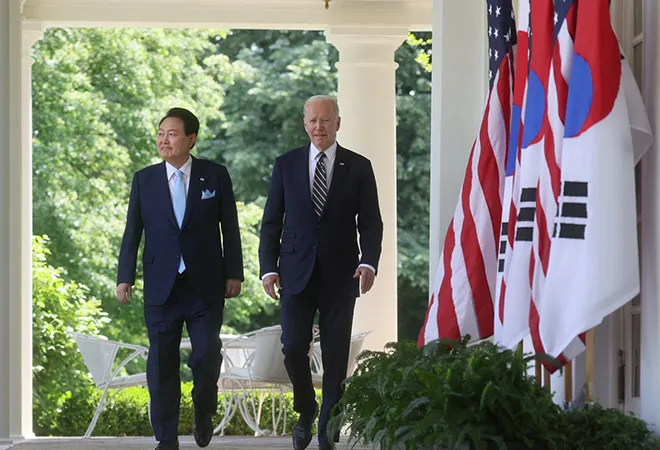
From balancing to accommodating
From the Korean War until the end of the Cold War, South Korea primarily relied on the United States (US) for its security policy. However, post-Cold War, South Korea adopted a foreign policy approach that balanced its economic and security needs between the US and China. In this context, South Korea recognised the importance of engaging economically with China, with Beijing being a major stakeholder in promoting peace on the Korean Peninsula. While South Korea's diplomatic and economic diversification efforts with China helped to mitigate the North Korean threat at that time, the situation has since deteriorated, with North Korea's nuclear programme and China's assertive behaviour in the South China Sea and East China Sea posing significant challenges to South Korea's security. This state of affairs can be attributed to South Korea's
diplomatic missteps, including its over-reliance on the US to address the North Korean threat, as well as its decision to engage with China. Thus, whether it was bandwagoning with the US during the Cold War or pursuing a more ambivalent approach in the post-1990s era to balance the US and China, South Korea's strategic choices have failed to yield the desired outcomes.
Currently, South Korea is
struggling to balance its alliance and autonomy and has been unable to independently navigate its foreign policy options. However, against the backdrop of escalating US-China competition in the region, and to avoid getting entrapped in their rivalry, South Korea sought to reduce its dependency on both states. Thus, to fulfil this objective, South Korea launched the New Southern Policy (NSP) in 2017, which aimed to diversify the country's economic, strategic, security, and diplomatic relationships with India and ASEAN countries. Later, it was followed by Seoul’s
Indo-Pacific strategy, which is an attempt to position South Korea as a sincere middle power by reinforcing its security alliance with the US, diversifying its security partnerships, and advocating for a free, peaceful, and prosperous Indo-Pacific.
South Korea is struggling to balance its alliance and autonomy and has been unable to independently navigate its foreign policy options.
Nonetheless, despite South Korea's efforts to reduce its dependency on the US and diversify its relationships in the Indo-Pacific region, its strategic choices have continued to reflect a balancing act between the US and China. The country has refrained from using the term, Free and Open Indo-Pacific (FOIP), and China is
barely mentioned in its Indo-Pacific strategy document, indicating a desire to accommodate Beijing's interests. This approach has limited South Korea's role to mainly non-traditional security threats, which remained its biggest drawback. However, South Korean President Yoon Seok-Yeol has been vocal about the country's diversifying policies and expressed willingness to be part of the
Quad framework,
develop its nuclear weapons, and
reject any unilateral change in the status quo through force. However, these developments have prompted South Korea to take steps to meet its security goals, as demonstrated by the recent Washington Declaration.
Washington Declaration and QUAD Umbrella
Tensions seem to be running high because of the Russia-Ukraine conflict and amplified by
China's renewed threat to invade Taiwan. In the event of a potential invasion of Taiwan, China could leverage North Korea's military capabilities to open up
another front, posing a threat to both South Korea and the US and ultimately deterring the US from intervening in the Taiwan conflict. Additionally, China's unconditional opposition to the deployment of the Terminal High Altitude Area Defense (THAAD) in South Korea has significantly limited Seoul's ability to deter and ensure its security. Therefore, given South Korea's deteriorating security situation, it has secured a landmark security deal, the
Washington Declaration, with the US to counter the North Korean nuclear threat. The Declaration illustrates a significant step in elevating bilateral cooperation to counter North Korea’s nuclear threat. As part of the agreement, the US, from time to time, will dock nuclear-armed submarines in South Korea, and will also involve South Korea in its nuclear planning operations. In favour, Seoul has agreed not to develop its own nuclear missiles. Both leaders have hailed the declaration as an “unprecedented” commitment to enhance defence and protect US allies using nuclear weapons. The US President has
vowed to end the Kim regime if he dares to attack South Korea. The declaration has also stressed on the need to maintain peace in the Taiwan Strait. Resultantly, this deal has elicited concern from China, which
warns against “deliberately stirring up tensions, provoking confrontation and playing up threats.” Additionally, North Korea has also issued warnings to both states about the
serious consequences of their actions. Therefore, amidst this rising dual threat, it is crucial for Seoul to consider a realignment towards the Quad which could help in addressing this dual threat.
North Korea represents an immediate and significant threat to South Korea, but Quad considers it more of a regional threat, unlike China, which poses a global concern.
Meanwhile, the Quad's objective is about the Free and Open Indo-Pacific (FOIP) and its related activities. Though Quad is not a military grouping meant to counter China's presence in the Indo-Pacific, it is viewed as one. North Korea represents an immediate and significant threat to South Korea, but Quad considers it more of a regional threat, unlike China, which poses a global concern. South Korea has been strengthening its ties with key allies, including Australia, India, the US, and Japan (
recently normalised relations), which has the potential to foster enhanced cooperation. Additionally, Seoul is gradually decoupling from the Chinese economy, which allows for a freer hand in building relationships. North Korea is increasingly being discussed in the Quad Summits, with
condemnation of missile launches and coercive diplomacy expressed in 2022, accompanied by a commitment to focus on North Korea's denuclearisation. Nonetheless, there may be negative repercussions if Quad's focus is slowly expanding to include North Korea. Thus, Seoul's involvement in the Quad could be more productive through a Quad Plus forum, enabling it to obtain Quad support against North Korea while allowing the Quad to concentrate on China. The Washington Declaration could serve as a stepping stone toward this goal.
While the Quad members understand Pyongyang’s disrupting impact in the Indo-Pacific region, it is Seoul that faces the heat of continuous nuclear incitements.
Conclusion
South Korea may be able to expand its defence capabilities through its involvement with the Quad, while also increasing its engagement with NATO and the US in intelligence. While the Quad members understand Pyongyang’s disrupting impact in the Indo-Pacific region, it is Seoul that faces the heat of continuous nuclear incitements. However, South Korea needs to first establish itself as a reliable partner by
working comprehensively with other Indo-Pacific countries through multilateral and bilateral agreements, using its resources like Indo-Pacific Economic Framework (IPEF), CHIP-4, and Official Development Aid (ODA), and seeking and extending political support. The Quad's umbrella may provide South Korea with greater flexibility compared to the constraints it faced in 2017 when it signed military agreements to protect its economy. This process may take significant effort and time to establish a level of shared interests and values among Quad members. The Washington Declaration coupled with the idea of closer coordination with the Quad members, can reap great benefits for South Korea. While the Quad can share some of Seoul’s burden, Quad can expand its presence and vision, creating a non-zero-sum game arrangement.
Abhishek Kumar Singh is a PhD Candidate in International Relations at Kookmin University, Seoul
The views expressed above belong to the author(s). ORF research and analyses now available on Telegram! Click here to access our curated content — blogs, longforms and interviews.




 PREV
PREV


